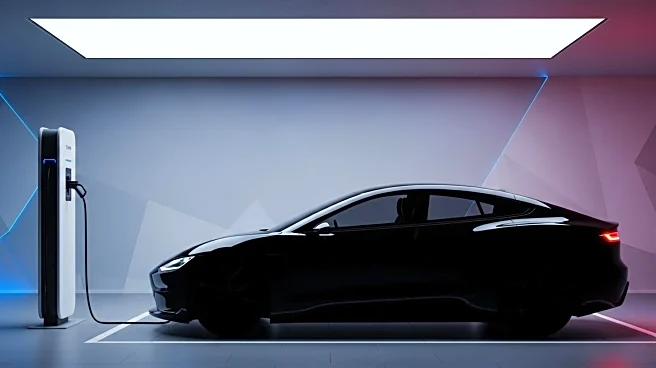What's Happening?
Tesla's market share in the U.S. electric vehicle market has dropped to new lows, according to data from Cox Automotive. In August, Tesla's share fell to 38%, marking the first time it has dipped below 40% since October 2017. This decline comes amid a surge in EV sales driven by the impending expiration of the $7,500 federal tax credit for electric vehicles. Tesla, which once held over 80% of the U.S. EV market, has seen its share steadily decline throughout 2025, dropping from 48.7% in June to 42% in July, and now to 38% in August. Globally, Tesla's sales have decreased by approximately 10% in 2025, with significant declines in Europe and China.
Why It's Important?
The decline in Tesla's market share is significant as it reflects the increasing competition in the EV market from legacy automakers and new entrants. The expiration of the federal tax credit is accelerating demand, but Tesla's ability to maintain its dominance is challenged by its limited and aging vehicle lineup. This shift could impact Tesla's financial performance, as the company relies heavily on vehicle sales for its profits. The broader EV market continues to grow, suggesting that Tesla's competitors are gaining ground, potentially reshaping the landscape of the U.S. automotive industry.
What's Next?
As the federal tax credit expires, EV sales are expected to drop in Q4, which may further impact Tesla's market position. The company may need to innovate or expand its vehicle lineup to regain its competitive edge. Additionally, Tesla's leadership may focus on diversifying its business model, emphasizing AI and robotics, to mitigate the impact of declining vehicle sales. The response from competitors and the market's adaptation to the post-tax credit environment will be crucial in determining Tesla's future trajectory.
Beyond the Headlines
Tesla's decline in market share highlights the challenges faced by companies with a strong reliance on a single product line. The evolving EV market demands continuous innovation and adaptation, and Tesla's current strategy may need reevaluation. The company's leadership and public perception also play a role in its market performance, as consumer preferences shift towards newer and more diverse offerings.










